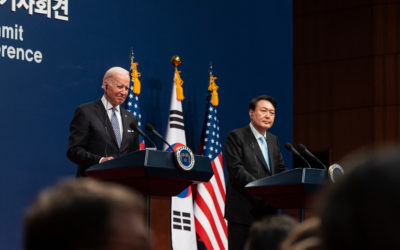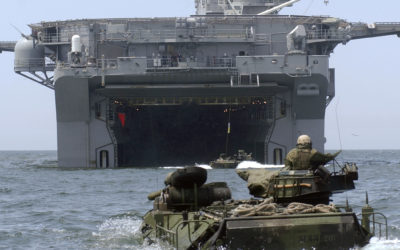On April 26, U.S. President Joe Biden welcomed South Korean President Yoon Suk-yeol to the White House for a summit meeting to celebrate the seventieth anniversary of the U.S.-South Korea alliance and open a new chapter for the next seventy years of expanded cooperation. Amid a substantial list of topics discussed by the two leaders, extended deterrence emerged as the top deliverable.
How Will China Respond to Taiwan’s President Tsai Ing-wen’s Visit to the United States?
How Will China Respond to Taiwan’s President Tsai Ing-wen’s Visit to the United States?
How Will China Respond to Taiwan’s President Tsai Ing-wen’s Visit to the United States?
Taiwan’s President Tsai Ing-wen will visit the United States next month. China is sure to retaliate, but how far it goes will say a lot about the trajectory of cross-strait and U.S.-China relations.
Taiwan’s President Tsai Ing-wen will reportedly meet with U.S. House Speaker Kevin McCarthy in California rather than in Taipei next month, attempting to avoid a Chinese response similar to the one that followed then-Speaker Nancy Pelosi’s August 2022 visit, when China conducted large military exercises and missile tests and imposed a host of economic sanctions on Taiwanese entities.
This is a wise decision, one that will allow McCarthy to demonstrate high-level, bipartisan support for Taiwan without closing the door on a future visit to Taipei. Although China will surely voice its displeasure and punish Taiwan in some fashion, its reaction will likely be more muted than the one that followed Pelosi’s trip to Taiwan.
President Tsai will “transit” the United States on her way to and from some of Taiwan’s few remaining diplomatic partners, a practice that began in 1994 when the United States allowed Taiwan’s president Lee Teng-hui to stop in Hawaii on his way to Nicaragua. Tsai has transited the United States multiple times during her presidency, most recently in 2019 when she stopped in New York and Denver. According to reports, Tsai will give a speech at the Reagan Library during her trip. While a public speech would draw Beijing’s ire, Tsai also spoke at Columbia University during the 2019 transit and provided public remarks during other stops in the United States.
In weighing how to respond, China will find itself having to choose between competing impulses. On the one hand, with Taiwan’s next presidential election less than one year away, Beijing will want to paint Tsai’s Democratic Progressive Party (DPP) as irresponsible and incapable of handling cross-strait issues. Policymakers in Beijing could conclude that a strong response to Tsai’s meeting with McCarthy can help convince Taiwanese voters not to elect another DPP candidate to the presidency. China could also decide that this is a good opportunity to continue to shift the status quo in its favor by normalizing military activity closer to Taiwan’s shores, as it did following Pelosi’s visit. China will also feel compelled to assert that closer U.S.-Taiwan relations are unacceptable and will come at a significant cost.
The state of U.S.-China relations could also prompt Beijing to conclude that it should respond forcefully, or at the very least that it has nothing to lose in doing so. Still fuming over the U.S. decision to shoot down a Chinese spy balloon, the recent public disclosure that China was considering selling weapons to Russia, ongoing hearings of the House Select Committee on China, and renewed focus on the origins of the COVID-19 virus (to name some developments from just the last few months), China could decide to use this moment to impose costs on the United States.
On the other hand, a Chinese response akin to the one that followed Pelosi’s visit would backfire. Rather than prompting U.S. political leaders to conclude that they should dial back interactions with Taiwan, an overbearing Chinese response would likely do the opposite. If China will respond in the same way regardless of the meeting venue, one might conclude, why shouldn’t senior U.S. officials and politicians travel to Taipei? If the cost is similar for any level of U.S.-Taiwan interaction, U.S. politicians and officials will choose to do more, not less, with Taiwan. A heavy-handed Chinese response would also likely further alienate the Taiwanese people and could draw support to the DPP in the upcoming presidential election.
Of course, the Tsai-McCarthy meeting will not be the only determinant of China’s response. The contents of Tsai’s speech at the Reagan Library, the seniority of the Biden administration officials with whom she meets, and the nature of her other public activities will all inform how China reacts.
Whether China chooses to calibrate its response or opts for large-scale military exercises and economic sanctions similar to those it introduced following Pelosi’s visit will reveal a lot about the future of cross-strait relations. If China chooses the former, there could be some basis for hope that tensions in the Taiwan Strait will not continue on an inexorable rise. If, however, China opts for a forceful response during a routine transit, it would be a troubling indicator that China will continue to find pretexts to increase its pressure on Taiwan.
It is more likely that China will register its dissatisfaction by imposing some largely symbolic economic sanctions on Taiwan, conducting large incursions into Taiwan’s air defense identification zone, and attempting to induce some of Taiwan’s diplomatic partners to switch recognition to the People’s Republic of China, while foregoing massive military exercises and missile tests. At the same time, with Xi Jinping accusing the United States of implementing a policy of “all-around containment, encirclement and suppression of China” and China’s foreign minister warning that unless the United States changes course “there will surely be conflict and confrontation,” one cannot foreclose the possibility that China will choose a disproportionate response. Such a decision would be a major warning about the future trajectory of cross-strait and U.S.-China relations.
Republished from the Council on Foreign Relations under a Creative Commons license in the United States.

David Sacks is a research fellow at the Council on Foreign Relations, where his work focuses on U.S.-China relations, U.S.-Taiwan relations, Chinese foreign policy, cross-Strait relations, and the political thought of Hans Morgenthau. He was previously the Special Assistant to the President for Research at the Council on Foreign Relations.
Related Articles
President Marcos Jr. Meets With President Biden—But the U.S. Position in Southeast Asia is Increasingly Shaky
Over a four-day visit to Washington, Philippine President Ferdinand Marcos Jr. has been welcomed to the White House and generally feted across Washington. With President Biden, Marcos Jr. (whose father was forced out of office in part through U.S. pressure, and whose family has little love for the United States) affirmed that the two countries are facing new challenges, and Biden said that “I couldn’t think of a better partner to have than [Marcos Jr.].”
The U.S. is about to blow up a fake warship in the South China Sea—but naval rivalry with Beijing is very real and growing
As part of a joint military exercise with the Philippines, the U.S. Navy is slated to sink a mock warship on April 26, 2023, in the South China Sea.
The live-fire drill is not a response to increased tensions with China over Taiwan, both the U.S. and the Philippines have stressed. But, either way, Beijing isn’t happy – responding by holding its own staged military event involving actual warships and fighter jets deployed around Taiwan, a self-governed island that Beijing claims as its own.



